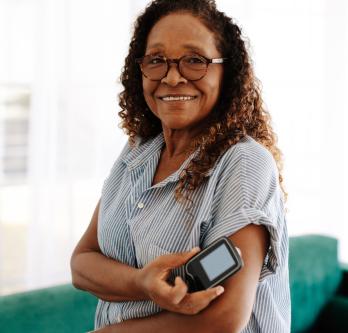
Diabetes
What is diabetes?
Diabetes is characterised by an excessively high level of sugar in the blood (glycaemia). Eventually, without appropriate treatment, this chronic hyperglycaemia increases the risk of cardiovascular disease: coronary thrombosis, stroke, etc. Other complications of diabetes can affect the eyes, kidneys and nerves.

There are several kinds of diabetes and they require sometimes different medical treatment. The most frequent are:
-
Type 1 diabetes, treated at the Convention du diabète [Diabetes Convention] centres;
-
Type 2 diabetes, with first-line treatment by GPs (Trajet de Démarrage) [Start-Up Pathway] and/or in a hospital environment, in the framework of a Trajet de soins [Care Pathway) or a Convention du diabète ;
-
Gestational diabetes, treated at Convention du diabète centres;
-
MODY type diabetes and other rarer genetic diabetes can also be treated at Convention du diabète centres
Care
A multidisciplinary team
The H.U.B Diabetology Clinic consists of a multidisciplinary team of medical, paramedical and nursing staff who are dedicated to optimal care for all diabetes patients in line with their specific needs.
In addition to the acts and services foreseen by the Care Pathways and the Diabetes Convention (in particular therapeutic education on insulin treatment), the Diabetology Clinic proposes specialised consultations for diabetic foot, gestational diabetes and hypoglycaemias.
Learning to manage your diabetes
Optimal diabetes care means autonomy for the diabetes patient in regard to their treatment. In this respect the H.U.B’s Diabetology Clinic has been a pioneer in therapeutic education. We consider the person with diabetes as a genuine partner in his or her care. Our team organises group sessions for treatment education, covering: the particularities of diabetes, diet management and, above all, how to (effectively) manage treatment with insulin.
Diabetic foot
With its myriad of small blood vessels and nerves, the foot is a zone that is particularly vulnerable to diabetes complications. This can result in desensitization and wounds or sores that do not heal. The persons concerned can make an appointment at the diabetic foot consultation, recognised as a reference centre by the INAMI [National Institute for Sickness and Disability Insurance]. Depending on their needs, patients are seen by a diabetes specialist, a nurse specialising in wound care, a chiropodist and, if necessary, a shoemaker. A vascular surgeon is also a member of the team.
Gestational diabetes
Women who develop diabetes during their pregnancy are at increased risk of certain complications during childbirth. They are also at a greater risk of developing type 2 diabetes later in life. These patients are treated jointly by the Diabetology Clinic and gynaecologists at the H.U.B’s Obstetrics Department both during and after their pregnancy.
(Non) diabetic hyperglycaemias
The H.U.B’s Diabetology Clinic diagnoses and treats hypoglycaemias. These (sudden) falls in blood sugar levels can, in their severe form, lead to behavioural disorders or even a loss of consciousness. A badly managed diabetes, an insulimona (rare tumour of the pancreas) or obesity surgery (bypass, gastroplasty) can result in severe hypoglycaemias.
Advice
If you are diabetic, as your GP if you can benefit from
These programmes entitle you to services, specialised consultations and additional reimbursements.
Focus
As a centre of excellence, the H.U.B Diabetology Clinic has signed a number of conventions with the INAMI so as to be able to offer persons treated with insulin access to the latest diabetes monitoring technologies. Most notably: different types of blood sugar sensors (for type 1 and type 2 diabetes), conventional insulin pumps and “patch” pumps without tubing (for type 1 diabetes). Some people with type 1 diabetes can also benefit from insulin treatment in a closed circuit. This automated “artificial pancreas” system consist of connecting a blood sugar sensor to an insulin pump. This system then effects the insulin injections semi- automatically.
Research
The H.U.B Diabetology Clinic participates in and/or initiates clinical trials on future medicines and new technologies for treating diabetes.